- Home
- Brian Hodge
Whom the Gods Would Destroy Page 3
Whom the Gods Would Destroy Read online
Page 3
“So what’s wrong with her?” he asked once we were upstairs, in private.
“Wrong? Nothing.” I shook my head. “I don’t follow you.”
“Wrong in the sense of, come on, Damien, you’ve got this appealing girl directly underneath you, maybe a little overly on the bookish side, but nothing wrong with that, and if my instincts are correct, I don’t think it would take much to persuade her to give you a try. And you’d match better, visually speaking. So what’s wrong with her?”
Speechless. I really had no idea how to respond to this.
Then Cameron appeared to only just now have an idea that he’d obviously held for much longer. “Ohhh,” he said. “You like the bad girls.”
I was right. He already knew. It wouldn’t have surprised me if he’d known where Ashleigh’s little pixie tattoo was, and even I hadn’t spotted that one at first.
“Are you really that blind to yourself? It’s so obvious to me what’s going on, and I just got here. You’re not that different. Poor guy, you’re still trying so hard to fill that void, aren’t you? You’re still looking to bring home a girl just…like…Mom.”
My teeth were grinding. “We just clicked, that’s all. It doesn’t have anything to do with what she does.” Then, without planning to, I lied. “I didn’t even know at first.”
“Really,” he said flatly. “I would’ve thought you met her while dating the earlier one who worked at the same place.”
Which stunned me. Cameron hadn’t just looked me up in the last week or two. This went back a minimum of months, and if it was months, then I had no reason to think it couldn’t have been much longer.
“How do you do it? You being you, and all. How do you bag these girls? I’m sincerely curious.”
Maybe he knew this too, if he’d been having me watched. “I, uh, go in there and…and start reading. I hardly ever look up at the stage. They’re not used to that. Sometimes it makes me this puzzle they want to figure out. So they come over, and…” And it felt deflating to me, hearing it out loud.
Cameron, though, was grinning. “Why, Damien, that sounds positively manipulative.”
“How did you get into my car?” I blurted.
“Glad you reminded me. Your spare.” He fished in his coat pocket and drew out a dirty flat metal case, then tossed it to me. It rattled, and when I slid it open, I found a key inside. One of those magnetic holders for an emergency key, except I’d never seen it before. “I felt under a couple of fenders and there it was.”
I stared at it, scraping with my thumbnail at flecks of dried mud.
“You didn’t know it was there?” He seemed to find this…weak of me, I guess would be the best way to put it. “How long have you had the car?”
“Three years.”
“Now you never have to worry about locking yourself out. Although if I could find it…”
He just walked up and found it? There was something about the whole display I couldn’t quite buy into. It was a logical explanation, but there was something about it that seemed like a performance that he wanted me to see through, that he wanted to leave me feeling uneasy, as if he would always be three steps ahead.
And it was working.
“What is it you want?” I asked.
“I wasn’t kidding down there. I know you got the shit end of the stick, growing up. I wasn’t in any position to do anything about it when we were really young, and by the time I started to sort things out in my head, you were already gone. If you’ll allow it, I’d like to start making that up to you.”
A statement like that always means money. For a grad student, though, I was doing all right. Years ago, I’d learned how to turn applying for scholarships and grants into a part-time job. I didn’t need help, especially not the kind that would’ve left me feeling indebted to this person who regarded himself as my brother.
“There’s something I’d like to let you in on. To study, to…whatever you think is appropriate,” he said. “There could be a job in it for you, after you graduate.”
“A job.” I snorted. “Pull the other one.”
“Listen to me. You’d know better than I would that NASA funding is down to the loose change from behind the sofa cushions. You have to know that the future of space research and exploration is in the private sector now. The government’s lost all will and desire.” He let that sink in, giving the truth time to sting. “What’s your field of specialty here? Your big grad school project?”
“Refining ways of using data from the Kepler Space Telescope to find possible habitable planets orbiting red dwarf stars.”
He peaked one eyebrow. “How’s that work?”
Now I felt back on solid ground. “Compared to our sun, red dwarves are small and dim and cool. You can’t see them with the naked eye from here on Earth. But for every star you can see on a clear night, there are three red dwarves you can’t. With me so far?”
“Invisible dwarves. Got it.”
“The way we discover planets is when one crosses between us and its sun during its orbit. It gets backlit. That’s called its transit. By analyzing the light spectrum, we can get a good idea of what the atmosphere is like. Because red dwarves are so much cooler, the habitable zone is a lot closer. So Earth-sized planets in that zone have a much shorter year than we do. Their transits come around more often, and that means a lot more opportunities to spot them and figure out what they’re made of.”
“Really?” He looked disappointed. “It still sounds dull.”
“Not to me. You know, for someone who wants to make amends, you’re doing a killer impression of an asshole.”
Maybe Cameron didn’t know better. Maybe this was just his wiring, and asshole was his default setting, the same way some people have faces you want to punch on sight. But it was more than his demeanor that was off here. Making amends didn’t necessitate sleeping in the person’s car. All you had to do was show up at the door looking contrite. Instead, Cameron had been living rough for a couple of days or so.
“How about something a little more interesting. More definitive,” he said. “How about a subject like…what would you call it…astrobiology?”
He couldn’t hide it anymore. That whole asshole thing he was so good at? It may have come naturally, but it was a front, too, a rickety wall meant to hide the anxiety for as long as possible.
“What branch?”
He gave me an unsure look. “What have you got?”
I told him how, on the one hand, with astrobiology you could be talking about researching the effects of space on human beings, and potentially any flora and fauna we might take out there with us. Really, it covered the whole question of finding or terraforming habitable off-world environments that could sustain us, assuming the human race ever got serious about it. Surely that had to be what he was after.
Because…
Because the alternative was too outlandish to consider. The alternative had its own sub-label, exobiology, but on a practical level was theoretical. It covered the search and possibilities for signs of life anywhere else but here, and the worlds that could support it.
He couldn’t. He just couldn’t.
“So which one?” I said.
He looked stumped, then split the difference. “Kind of a cross between the two.”
He would say nothing more, insisting that I would just have to see what he had to show me. Not here, but down in Portland. Then, maybe, I would know how I wanted to proceed. The hints of anxiety were what convinced me that, however outlandish this sounded, he, at least, believed it. Fear like that, corrosive and eroding, is hard to fake for long. Fear like that has to be rooted in something real—misunderstood, maybe, but real—and a sense that you’ve gotten in over your head.
As if the possibility of employment weren’t enough, he had to dangle the kind of bait that someone like me would find irresistible.
“As sick in the head as she was, Mom was actually onto something,” he said. “Or something was onto her.”
* * *
I let Cameron have the place to himself while I went to stay with Ashleigh until the next morning. I thought it would’ve sent the wrong message to insist that he find a hotel room, something he hadn’t seemed inclined to do in the first place. The worst motel I’ve ever stayed in still beats the backseat of a Toyota parked on a north Seattle street in October. But neither was I up for trying to find enough small talk to navigate around the awkwardness of our situation.
Not that I was worried about it, but there was little in my home worth stealing, and unless he set the place on fire, there wasn’t much he could damage. At this point in my life, everything I valued most could fit in a backpack or resided in my head.
I wasn’t always going to be so unencumbered, so mobile. I needed to enjoy it while I could.
Ashleigh understood my reluctance to send Cameron back out into the rain, and then again she didn’t. It wasn’t out of any appeal to rank. When it came to the concept of brother, I had all the brother I ever needed in Shawn Cotterell, my best friend from grade school, whose family made room for me when they grasped what was really going on at home, that I wasn’t making up stories.
But for the first time I was starting to put myself in Cameron’s shoes, all the way back to the time they were tiny, outgrown in a month or two. What would it be like to be raised by a woman for whom you could do no wrong? She told him he was special. Told him he was perfect. She told him that his birth was immaculate. She assured him he was blessed far above any child who’d ever lived, or would ever be born again, until all life on Earth was extinguished. She promised him dominion over worlds—plural.
Why would he not grow up believing every word of it? He’d had no dissenting view. With me, she’d done the opposite. While never coming right out and saying so, she’d nevertheless told me I was worthless. But I’d been lucky, had had the Cotterells, Shawn and his older sister and their two sane parents, an entire sane family working to counter the messages I got at home, and it just about balanced the scales. Cameron had had no such leveling agent.
What our mother had done, I was finally realizing, was follow a letter-perfect recipe for creating a monster.
“I just want to give him a chance. I want to believe there’s some good in him,” I told Ashleigh. “Considering how our mother indulged him, he could be worse.”
“He already had his chance,” she said. “By the time you left home, he was old enough to know what’s right and what isn’t. He was old enough to stand up for you and say how your mother was treating you was wrong. But he didn’t.”
Actually…
He had. I remembered this distinctly, because it had meant something to me at the time, seeing my big brother develop an understanding, either by observation or moral intuition, that her making such stark distinctions between us wasn’t right. Hearing him question her on it, suggesting that she shouldn’t ignore me, exclude me, give me double the chores. Cinderella Boy—he used this term to describe me, and he knew it was wrong.
So he’d tried. Tried, and got shut down for it. She had her ways. Realistically, he was as powerless as I’d been back then.
So why didn’t I share this with Ashleigh? Maybe I wanted her support on this to be uncontaminated by nuance. Maybe I was small enough to want her to see me as unquestionably the bigger person.
“Then what I want,” I fibbed, “is to give him one more chance to be what he should’ve been before.”
“What was your mother’s problem, anyway?”
“I don’t really know. Disillusionment, maybe?” I pulled my iPad from my backpack and called up the photos, then swiped through a few screens of thumbnails until I found the picture, scanned from an old hardcopy, I wanted Ashleigh to see. “That was her. When she was about the same age we are now. Before Cameron was born.”
She stared, quizzical. “What was this, some Halloween costume?”
“No. This was her. Back then.”
“She was an actual, honest-to-God nun?”
“For six or seven years.”
“Mind? Blown,” Ashleigh said. “What happened?”
I had to plead ignorance on anything other than obvious generalities. “I wasn’t the one she confided in. If she confided in anyone at all.”
It was sourced from a faded photo from nearly thirty years ago. When I’d scanned the original, my first impulse was to grind it through the Photoshop mill and spruce it up—repair the surface damage, fix the white balance, brighten the colors, make it look new again. But I decided it needed to remain vintage.
I’d had few photos of my mother to begin with, and this was the only one I’d kept. It had the feel of a candid shot that looked almost posed, a simple head-and-shoulders close-up against a background of polished wood. You could see the black shoulders and white collar of her habit, and the wimple, although as a uniform these didn’t look as severe as many that I’ve seen. She was thin-faced and big-eyed, looking thoughtful with her gaze flicked to the right, under a fringe of brown bangs. Some might call her plain and some might call her pretty, and I could see how they both would be right.
In spite of everything, I liked the photo for its reassurance that my mother hadn’t always been what I’d known. It seemed to hint at a decency in her that she’d lost. She looked at home, as if she knew she was where she belonged. Even if the beliefs behind it had always been just so much superstition to me, as long as they gave someone a moral framework that manifested itself in charity and compassion, it wasn’t my place to complain that they could still do the deeds without the dogma.
Instead, though, she had jettisoned everything, faith and acts alike. She’d chosen to become what I’ve heard called a murderer of God.
When you ask what does it mean to be a murderer of God, then you have to say that it means to kick over all moral traces, I heard once in a recorded lecture on anti-Semitism. To be a murderer of God means to be the opponent of anything decent, anything humane, anything moral, anything ethical.
There were worse things than believing in a fairy tale.
There was believing in its opposite.
* * *
We were achingly domestic that evening. I studied, prepping for the week, while Ashleigh, off for the night, watched TV and played nail-scrabbling games of fetch with Isis, a sable Husky with blue eyes so pale they looked unearthly. Rescue dogs make the best dogs—that was Ashleigh’s motto, but by most standards, Isis was still a challenge, a high-strung abuse case who’d needed a lot of time and patience and love before she’d settled down into the calmer version I’d come to know. Ashleigh had taken her in last year because she couldn’t bear the thought of no one else being willing to do it.
Isis still didn’t trust easily. Or rather, indiscriminately. She accepted you or she didn’t. She relaxed around you or she didn’t. If the verdict was no, time wasn’t likely to change it.
I wondered what she would make of Cameron.
My guess was that she would want nothing to do with him. She would back away as if from a caustic smell. Her instincts would tell her to run, and she would obey. It wouldn’t matter if they had a history between them. To her mind, there would be nothing left to repair, no complexities to consider. With no guilt afterward about possibly making the wrong call, either. That might have been the best part of all.
Around 10:30 that night, while I worked at the dining table, Ashleigh looped her arms around me from behind and kissed me good night. Was I going to be much longer? Give me another hour, I advised. That should do it.
“Have you checked the fridge door?” she wanted to know. “For today’s reason?”
“Not yet.”
“Don’t forget,” she said. “I think you’ll really like today’s.”
Later. For now, my attention was unilaterally focused, and appearances to the contrary, it had nothing to do with school. The main reason I was here and Cameron was bunking at my place was so I could have time to research him without anyone looking over my shoulder.
An h
our with Google and you could get a pretty good fix on anybody.
At first glance, he appeared to keep a surprisingly low profile for someone his age, at least where frivolities were concerned. If he was into social media, it wasn’t under his own name.
My first double-take came early. Two years ago he’d received a $250,000 genius grant from a desiccated-looking German industrialist named Maximilian Koenig. The article cited Cameron as an independent researcher of consciousness paradigms, whatever that was supposed to mean.
Still, with that kind of cash in play, maybe he actually was tapped into a network that could offer employment.
When Cameron was barely into his twenties, he was at the center of a bizarre legal case in Pennsylvania, in which a township had planned on resorting to the almost unheard-of step of using an archaic blasphemy statute to shut down something he was behind, called the Fifth Way. It was most certainly an officially sanctioned nuisance lawsuit that would’ve failed in court, although it never got that far; the venture withered after the building they used burned to the ground in a suspected case of arson that was never formally investigated. Normally I would have been on his side against small-minded bigots, no matter how silly the ideas he was promoting at the time, but it nevertheless made me wonder: What does it take to provoke people into behaving like a mob of frightened peasants?
Several times, mostly on discussion forums, I saw him referred to as the author of something called To Love the Earth, To Hate the World, variously described as a polemic, a manifesto, and a call to revolution. It evoked reactions all the way from praising it as a brilliant extrapolation of the panspermia theory to condemning it as appalling pseudo-science that was bound to get people killed.
Try as I might, though, I was unable to find a copy of the work itself. The few links that I found were dead. And I really would’ve liked to see what it had to say…panspermia, after all, being the controversial theory that life is abundant throughout the universe, its constituent biochemical compounds seeded into habitable worlds by a random but self-propagating distribution system of comets, meteors, asteroids, and so on.

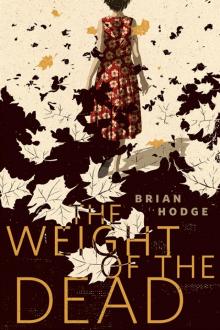 The Weight of the Dead
The Weight of the Dead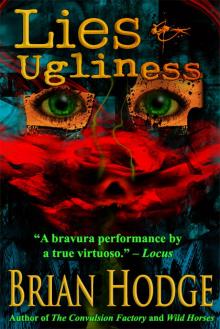 Lies & Ugliness
Lies & Ugliness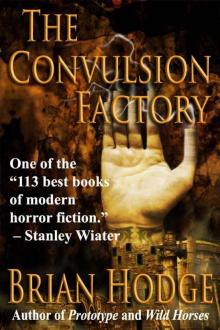 The Convulsion Factory
The Convulsion Factory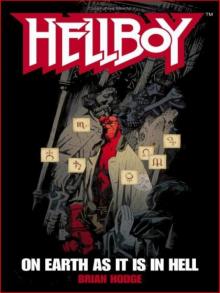 Hellboy: On Earth as It Is in Hell
Hellboy: On Earth as It Is in Hell Whom the Gods Would Destroy
Whom the Gods Would Destroy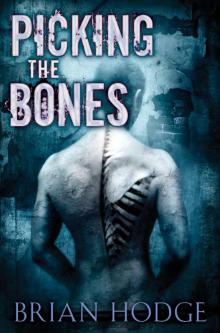 Picking the Bones
Picking the Bones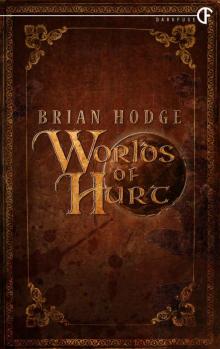 Worlds of Hurt
Worlds of Hurt Oasis
Oasis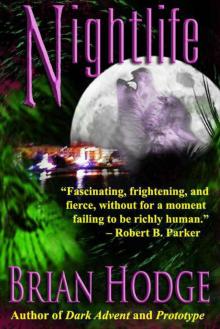 Nightlife
Nightlife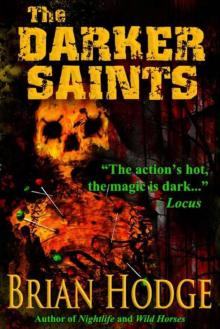 The Darker Saints
The Darker Saints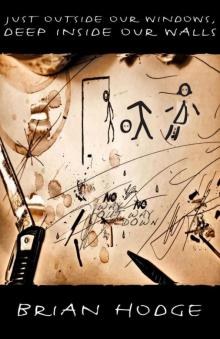 Just Outside Our Windows, Deep Inside Our Walls
Just Outside Our Windows, Deep Inside Our Walls A Haunting of Horrors, Volume 2: A Twenty-Book eBook Bundle of Horror and the Occult
A Haunting of Horrors, Volume 2: A Twenty-Book eBook Bundle of Horror and the Occult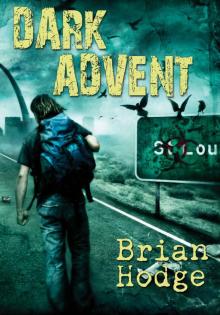 Dark Advent
Dark Advent Mad Dogs
Mad Dogs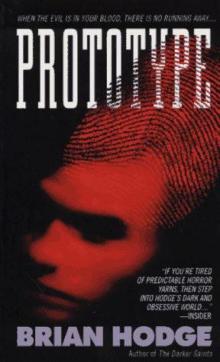 Prototype
Prototype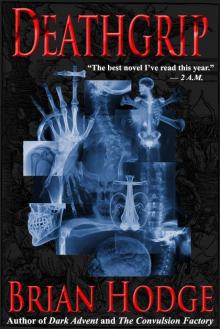 Deathgrip
Deathgrip Falling Idols
Falling Idols